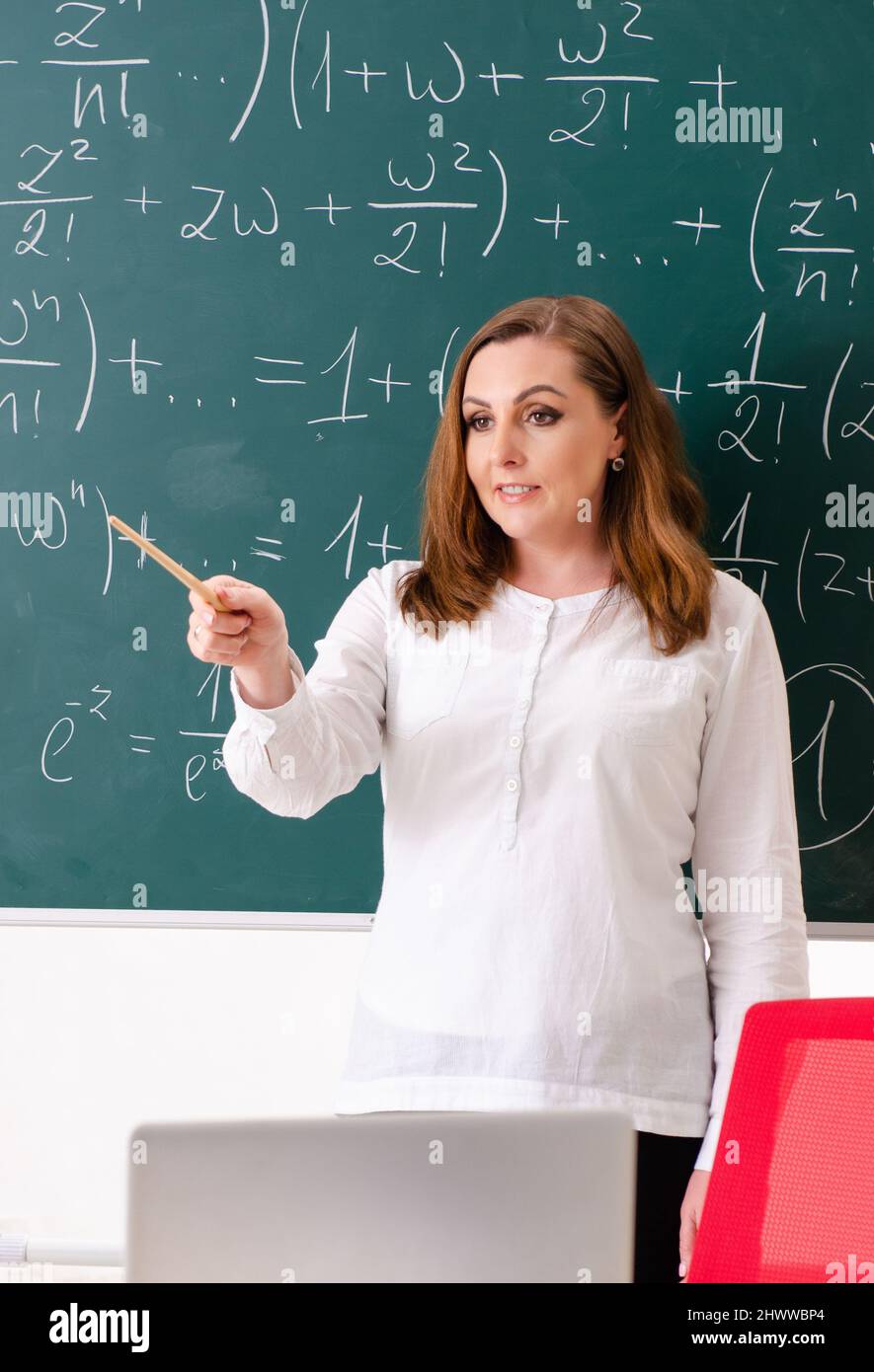A complete guide to how experienced math teachers apply technology in the classroom
Wiki Article
Achieving Enterprise Quality: Understanding Market Standards and Strategic Leadership for Mathematics Professors
Accomplishing business excellence in mathematics education and learning necessitates a careful examination of market requirements and the duty of calculated leadership. Mathematics faculty need to recognize how these criteria shape curriculum and mentor approaches. In addition, reliable leadership can drive collaboration and professional advancement amongst instructors. This multifaceted method elevates inquiries concerning the sensible implications for trainees' job preparedness. What approaches can faculty embrace to link the gap between education and sector demands?The Importance of Sector Standards in Mathematics Education
In the domain name of maths education, adhering to market criteria is essential for making sure that programs properly prepare trainees for real-world applications. Market criteria give a framework that lines up educational outcomes with the abilities required in different occupations. By including these criteria, math programs can enhance their importance and roughness, thus enhancing trainee involvement and learning results.
Strategic Leadership: Defining Duties and Obligations
Effective critical management within mathematics professors requires a clear meaning of functions and responsibilities to guarantee perfect working and placement with institutional goals. Leadership structures need to be developed to define jobs amongst professor, managers, and support team, making sure that each specific recognizes their payments toward collective objectives. Faculty leaders should cultivate an environment that promotes cooperation and responsibility, making it possible for staff member to engage successfully in curriculum advancement and evaluation procedures.Furthermore, calculated leaders must focus on recurring specialist development, guaranteeing that professor are well-appointed to satisfy the progressing needs of mathematics education. This includes not just straightening private duties with institutional priorities yet additionally promoting a society of constant improvement and advancement. By plainly defining roles, tactical management can boost communication, enhance decision-making processes, and eventually add to a much more effective and cohesive mathematics faculty, poised to fulfill the challenges of modern education.
Finest Practices for Enhancing Mentor and Discovering
In the search of improving mentor and discovering, math professors can profit from cutting-edge training approaches that involve pupils effectively. Carrying out joint understanding settings cultivates teamwork and crucial reasoning skills amongst students. These finest practices are important for creating a dynamic educational experience that advertises much deeper understanding of mathematical ideas.Innovative Teaching Approaches
While typical techniques of mentor have their location, cutting-edge teaching techniques are important for improving engagement and understanding amongst maths faculty and their pupils. Strategies such as flipped classrooms and problem-based discovering urge active engagement, permitting pupils to take possession of their knowing. Integrating innovation, such as interactive simulations and on the internet collaboration devices, additionally sustains varied understanding styles and promotes critical reasoning. Furthermore, using real-world applications in lessons aids students connect mathematical principles to everyday life, making the subject extra appropriate and attractive. Professor who accept these strategies can produce a dynamic knowing setting that not only boosts comprehension however also influences a long-lasting passion for maths. Adopting ingenious strategies inevitably causes greater levels of trainee success.
Collaborative Discovering Settings
Building on the cutting-edge training strategies formerly discussed, collaborative knowing environments play a critical duty in boosting the instructional experience for maths faculty and their trainees. These atmospheres motivate active engagement and foster a feeling of community, enabling students to learn from one another and create essential assuming abilities. Ideal methods include structured team job, peer tutoring, and project-based discovering, which promote collaboration and shared responsibility for finding out end results. Faculty should facilitate conversations and supply assistance while allowing pupils to check out concepts jointly. Furthermore, integrating modern technology can boost partnership by providing systems for communication and source sharing. Eventually, collaborative understanding atmospheres empower pupils to take ownership of their education and learning and cultivate a much deeper understanding of mathematical ideas through synergy and interaction.
Straightening Faculty Goals With Institutional Purposes
Lining up professors goals with institutional purposes is important for cultivating a cohesive instructional atmosphere that boosts both mentor performance and trainee success. When professors participants understand and accept the broader mission of their institution, their training techniques can be customized to support these goals. This positioning guarantees that faculty are not only fulfilling departmental expectations yet also adding to the overarching objectives of the institution, such as enhancing trainee involvement and academic efficiency.To achieve this positioning, normal communication between faculty and management is crucial. Workshops and joint meetings can assist in conversations on institutional concerns and just how professors can incorporate these right into their curricula. Additionally, performance evaluations can be made to reflect these aligned goals, motivating professors to introduce in their training approaches. Ultimately, when professors goals reverberate with institutional purposes, they cultivate a much more unified strategy to education and learning, benefiting both instructors and students alike.
Cultivating a Culture of Constant Renovation
Cultivating a society of continual improvement within mathematics faculty is necessary for boosting both training high quality and trainee results. This includes creating an atmosphere where professor are urged to consistently analyze their training techniques and look for comments. Professional development opportunities must be offered, enabling educators to explore brand-new instructional approaches and integrate evidence-based techniques right into their educational program.website here
Partnership amongst faculty is vital; sharing experiences and insights can lead to cutting-edge options and enhanced teaching methods. Organizations should implement systematic analysis processes, allowing professors to show on their efficiency and recognize locations for development.
Lastly, acknowledging and commemorating accomplishments, regardless of exactly how little, enhances the dedication to enhancement. By embedding constant renovation into the faculty society, math divisions can improve their general performance, eventually benefiting both teachers and pupils in the check my source search of academic excellence.
Ingenious Approaches to Mathematics Program Development
Various ingenious strategies can transform mathematics program advancement, making it a lot more receptive to the evolving instructional landscape. experienced math teachers. One effective strategy includes incorporating technology, such as on the internet understanding platforms and interactive software application, to enhance trainee interaction and accessibility. This shift enables for a mixed knowing atmosphere, satisfying varied understanding stylesEmbracing a project-based learning framework encourages collective problem-solving and real-world application of mathematical concepts. Professors can also emphasize interdisciplinary connections, illustrating how mathematics converges with areas like scientific research, art, and engineering, cultivating an extra holistic instructional experience.
Routine feedback from students and sector stakeholders can assist curriculum adjustments, making certain importance and rigor. Additionally, offering expert advancement chances for professors can advertise ingenious teaching techniques and keep teachers educated of the current patterns. With these strategies, math programs can grow a vibrant understanding environment that prepares students for future obstacles and occupations.
Frequently Asked Concerns
Just How Can Professors Determine the Influence of Market Standards on Trainee Outcomes?
Professors can gauge the effect of industry requirements on trainee outcomes by evaluating assessment outcomes, tracking employment prices, soliciting company feedback, and carrying out longitudinal researches to compare pupil performance prior to and after executing the criteria.What Resources Are Offered for Professional Growth in Mathematics Education?
Many resources for expert advancement in maths education consist of online programs, workshops, webinars, expert companies, conferences, and peer partnership possibilities. These systems facilitate ability enhancement, cutting-edge teaching techniques, and efficient integration of innovation right into maths instruction.Exactly How Do Industry Standards Vary Throughout Different Geographical Areas?
Sector standards vary significantly throughout geographical areas as a result of elements like governmental guidelines, educational priorities, and cultural influences. These inconsistencies can influence educational program development, training approaches, and the application of evaluation techniques in maths education and learning.What Duty Does Technology Play in Achieving Business Quality in Mathematics?
Technology enhances venture quality in mathematics by streamlining procedures, allowing information evaluation, fostering partnership, and supplying accessibility to sources. It encourages students and instructors alike, advertising pop over to these guys cutting-edge training approaches and boosting general academic results in the field.How Can Professors Properly Team Up With Sector Partners?

In the pursuit of enhancing mentor and discovering, math faculty can benefit from ingenious teaching approaches that engage pupils effectively. While typical techniques of mentor have their area, ingenious mentor methods are vital for boosting engagement and understanding amongst maths professors and their students. Building on the cutting-edge mentor strategies formerly gone over, collaborative discovering atmospheres play a critical function in improving the educational experience for mathematics faculty and their pupils. Aligning faculty objectives with institutional objectives is essential for cultivating a cohesive academic setting that improves both teaching efficiency and pupil success. Fostering a culture of constant enhancement within maths professors is essential for improving both training quality and trainee results.
Report this wiki page